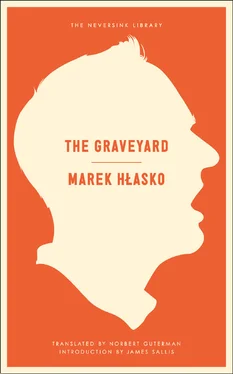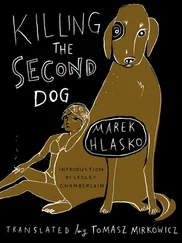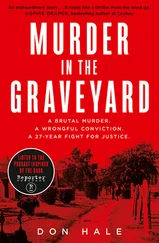COLD WEATHER AND RAIN HAD LONG TORMENTED the city; and the fact that May Day fell on the first cheerful and warm day made it a doubly joyful occasion — as was duly pointed out by the radio and the press. From the early hours of the morning the streets had been filled with people, animated and wearing their May Day best; parades were forming on the large squares; a thousand huge loudspeakers set up for the purpose roared sprightly marches and songs. In the motley crowd regional costumes stood out brightly — the mountaineers’ caps with their black tassels, the open collars and fancy jackets of the miners whose joyous faces were concealed behind the colored glass of their masks. The wind flapped the banners and wreaths, and the sun had had time to put a flush on the faces of those who had been out since morning — it was a truly beautiful day. Finally, at noon, solemnly announced by the city clocks, the procession set out.
A slightly drunk little man in a shabby suit stood near the curb of a crowded sidewalk. He stared intensely at the briskly marching people, and under his breath read off the inscriptions on the banners: “Our answer to the atom bomb — we build new houses,” “Man is our supreme good,” “The working class leads the people,” and so on. The little drunk rubbed his hands and laughed softly, but happily; he stood on tiptoe, thrust his head under the arms of people in front of him, and when he saw, among the marching throngs, the groups of workers from the “For a Better Tomorrow” automobile repair factory, he began to clap so loudly that everybody beamed and nodded in approval. Indeed the group of the workers from “For a Better Tomorrow” presented an impressive appearance: they were carrying a huge model of a car, and all of them wore identical blue overalls; one of the marchers even led a magnificent Airedale terrier on a leash: the beautiful dog had a red cockade tied to its head, and an artistically wrought muzzle on its thoroughbred snout. The little man, seized by euphoria, clapped so vigorously and enthusiastically that at one point he tottered with exhaustion, falling against the man standing behind him, who calmly but firmly restored the drunk to his former position by nudging him with his knee.
“Hey,” the little man said indignantly, “stop shoving.”
“What’s the matter?” the man behind him said in a brisk voice. “Maybe you don’t like it? Now tell the truth, do you like it or don’t you?”
The little man turned as though struck by an electric current. He saw a sturdy, handsome policeman in dress uniform. The buckle of his belt, the metal edge of his visor, his clasps, the brass butt of his gun, the new leather belt and boots — all these things gleamed so brightly in the spring sun that it hurt the eyes to look at them. The little man smiled happily. “So you’re here too?” he said.
“Of course,” the policeman replied, and once again gently pushed the little man with his knee. This time, the little man moved forward without protesting, and even tipped his greasy hat.
“Yes,” the little man said, “yes …” Happily rubbing his dirty hands, he repeated: “Yes, yes … You remember me, of course?”
The policeman glanced at him and gave a superior smile. “Disturbance of the peace at night,” he said. “I took you to the police station.”
“Yes, yes,” the little man said eagerly, “it was you. You yourself — I mean you in person. Because there was another policeman with you, right?” He staggered again, but another push righted him and restored his dignity.
“Right,” the policeman said. “What of it? Maybe you don’t …”
The little man interrupted him with a wave of his hand. “Everything’s perfect,” he said. “It seems I said a lot of things that time. Otherwise I would’ve had to march with these people here. As it is, I’m standing comfortably, as you see. All the more so because this is a fairly long parade: those in front are executed by firing squads, and those in back see nothing and sing.”
“Well, I’ll be d—”
“Sure,” the little man said. “Don’t you remember? I told you then, my dear man: the crimes, the distortions, the ideology replaced with totalitarianism, all this does no harm to anyone. Man’s drama cannot be handed down to posterity: while one generation matures and accumulates experience, history produces a new generation of carefree folk who willingly join the ranks. You don’t have to worry: you’ll have a job to the end of your days. Just as I told you then.”
“When?” the policeman said. “When?”
The little man wagged his finger in his face and began to giggle. “You’re a joker, a joker.” He burst out laughing. “And as for me, you know,” he said, “I got into some trouble because of that.”
“Because of what?”
The little man grew suddenly angry. “What do you mean, because of what?” he cried. Once again the other’s knee put him in his place. “Because of what I said then. I said all that to you and the others in the police station. What do you think? This parade, these happy faces? It’s all exactly as it should be, and I believe that everything’s perfect, everything — just as I said. Every tyranny ends more or less like a woman’s beauty: the more magnificent the façade, the more rotten the core; the prettier the dress, the filthier the body; the more talk about strength and loyalty, the more terrorism and the weaker the rulers. Whores and tyrants end the same way — can’t you understand even the simplest things? But here everything fits like a jigsaw puzzle. What do you want, what do you lack? Hope? You have hope: the knowledge that thousands of others are as pushed around and despised as I am, that those who were born before us were just as pushed around and despised, and that those who will be born after us will be treated the same way. Doesn’t all this make you happy? How many times must I tell you, ha?”
“Wait a minute,” the policeman said, rubbing his forehead. “When did you tell me that?”
“Then,” the little man said, “it was then that I told you all that. But then or now, sooner or later, what’s the difference? You’ll always find someone who understands too much and who will have to die for it. And even if he doesn’t understand, it will always be necessary to find someone or other, to denounce him and accuse him for nothing, and to no purpose; a man who will be tracked down and tormented, and who in the end will be caught and put to death; who will be ordered to sing a hymn in honor of his killers; and this will have to be done if only to stop other members of society from some day conceiving the idea that they can decide the fate of others. That’s how it should be; and, damn it all, why should any of this surprise you? What is man, after all is said and done, man with all his sufferings, aspirations, loves? An eternal absurdity in the infinite. To save man from realizing this, it will always be necessary to find some Franciszek or other.”
The policeman’s healthy face displayed boundless despair. “What Franciszek?” he asked, wiping the sweat off his forehead. “Saint Francis of Assisi?”
“No,” the little man said, stamping his foot angrily. “I’ve always told you, there aren’t any heroes or saints; there’s only necessity which forever and ever squeezes what is required out of man. Why a saint? Kowalski is enough. With every Kowalski one can do what is necessary, one way or another, if circumstances so require.”
“Mister,” said the policeman. “Who did you say all this to? Please tell me, or I’ll go into this passageway and shoot myself. Tell me, tell me,” he cried tearfully. “I can’t stand not knowing.”
“To you,” the little man said vengefully. “To you and the others. Then, in the police station.”
Читать дальше






![Ричард Деминг - Whistle Past the Graveyard [= Give the Girl a Gun]](/books/412176/richard-deming-whistle-past-the-graveyard-give-t-thumb.webp)


